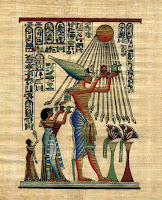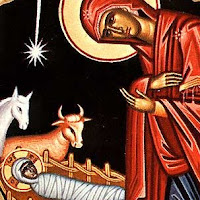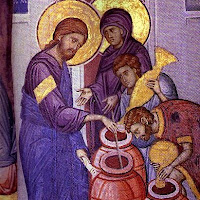 Νυνι δε εν Χριστω Ιησου υμεις οι ποτε οντες μακραν εγγυς εγενηθητε εν τω αιματι του Χριστου.
Νυνι δε εν Χριστω Ιησου υμεις οι ποτε οντες μακραν εγγυς εγενηθητε εν τω αιματι του Χριστου.But now in Christ Jesus, you that used to be so far apart from us have been brought very near, by the blood of Christ.
Ephesians 2:13
Far… How hard, how painful it is to hear this word that describes the state of separation! Whether it be our state before we meet the Lord, or whether it be our state after, it doesn't matter. In either case, it is sin that separates us from Him. Why is this? Because a holy God demands holiness in us, ‘I am the LORD your God; sanctify yourselves therefore, and be holy, for I am holy’ (Leviticus 11:44), and not only under the old Law, but even under the Law of Christ, for apostle Peter writes the same, ‘Be holy, for I am holy’ (1 Peter 1:16).
 The ancient Church was far more rigorous than the Church today, yet they too had Christ and lived the life of grace, not works. Here follows an excerpt from the book An Interpretation of the Divine Liturgy Based on Actual Events and Experiences of Holy Priests, Monks and Lay People by Protopresbyter Stephanos K. Anagnostopoulos. When writing about the litany of the catechumens he explains the different categories of penitents. This was posted in Fr Milovan's blog Again and Again, and it was too good not to share.
The ancient Church was far more rigorous than the Church today, yet they too had Christ and lived the life of grace, not works. Here follows an excerpt from the book An Interpretation of the Divine Liturgy Based on Actual Events and Experiences of Holy Priests, Monks and Lay People by Protopresbyter Stephanos K. Anagnostopoulos. When writing about the litany of the catechumens he explains the different categories of penitents. This was posted in Fr Milovan's blog Again and Again, and it was too good not to share.What a discipline the ancient Church exercised within herself! Why am I drawn to say, ‘This is the good way,’ even though I might find myself in one of these categories of penitents? I would rather that the Church today could speak, act and live under such authority, so that she would reflect her Lord even more, of whom they said, ‘What is this? A new teaching—and with authority! He even gives orders to impure spirits and they obey Him!’ (Mark 1:27).
Thank you, Fr Milovan, for again bringing our attention to something very important. This is not merely a historical curiosity. We must think within ourselves, as the Church, ‘Why are we not living like this?’ And then, after thinking, praying, let us act as the Lord directs. His Word to us is always fresh and true, and we should always be like young plants awaiting eagerly the Sun of Righteousness and the Water of Life. These are only in Jesus. Then we can truly begin to grow and bear fruit.
Different Categories of Penitents
Secondly: The crying and afflicted. It concerned those who had committed deadly sins, who remained outside the Temple, in the countryside, come winter or summer (in snow, rain, cold weather, hail or extreme heat) and would ask from the Christians that would enter the Church, in lots of tears, on their knees, to pray so that God would forgive them. They would not even take Antidoron.
Thirdly: Those who fall. Inside the Temple those “falling” were constantly on their knees, even on Sundays. Due to the large number of sins they had committed they would only receive the bishop’s blessing – if there was one – or that of the priest who would perform the Liturgy, and would depart from the Church together with the Catechumens.
Fourthly: Those who stand in obedience. They are the majority of Christians today who are under a certain penance that forbids them to receive Holy Communion. They attend the Holy Liturgy until the end and take Antidoron.
There was another category of Christians who stood in obedience. They were inside the Temple during Divine Worship, they communed Immaculate Sacraments but the Church forbade them to knead prosphoron bread, that is to say, bring Precious Gifts for sanctification (offertory, nama = the wine used in the Holy Eucharist, candle, oil…) to the Temple.
Fifthly: Another category of Christians, who also remained in the Nave, departed the Holy Table together with the Catechumens. It was those who were under the influence of unclean spirits. On the one hand, they were baptized but demon-possessed.
The “Apostolic Injunction” says the following about them: When the deacon proclaimed “As many as are catechumens, depart. Depart, catechumens”, also addressing those who were under the influence of unclean spirits, he would say: “Pray for those who are under the influence of unclean spirits. Earnestly, all of you, pray for them so that our Befriended God through Jesus Christ rebukes the unclean and evil spirits and delivers His supplicants from strange authority… Those who are influenced, depart.” In other words, let them also depart. This ancient liturgical order like so many others, waned or rather was abolished.
(….)
Sixthly: the hearers. The hearers could have been the Jews or heathen idolaters who used to enter the Narthex to listen to and see the first part of the Divine Worship – and to especially attend the homily – and afterwards together with the Catechumens they would step out of the Holy Temple and the congregation.
While those crying and afflicted would remain outside, the hearers, even though they could have been Jews or heathen idolaters, would step into the Narthex!
The deacon would say aloud to the “hearers”: “Let none of the hearers remain. Let none of the unfaithful. Depart…”
During the moment of their departure the Celebrant used to pray with fervor for them, so that they would not feel embittered, supplicating: “That the Lord God, the All-Merciful, may open the ears of their hearts… catechize them with the word of truth… grant them a virtuous life…etc.”
The interest of the Church for the “hearers” was real to the point that most of them would depart the holy congregation of the Divine Worship with tears in their eyes. During these prayers the people used to chant multiple times and in a spirit of devoutness the prayer “Lord have mercy. Lord have mercy. Lord have mercy.”
Μαθητεύσατε πάντα τα εθνη
Make disciples of all nations
Matthew 28:19


















































